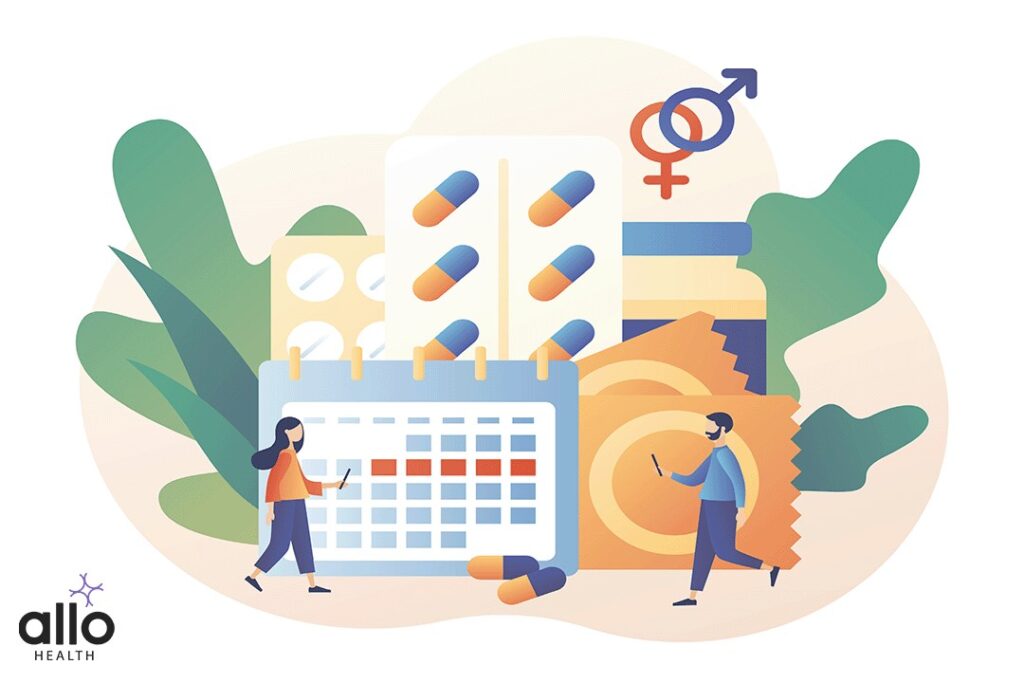Sexual Health Myths & Facts

Allo Health is dedicated to personalized well-being, offering support and trusted information tailored to individual health goals. The platform emphasizes human-generated content, led by a distinguished medical team of experts, including physicians and sexual health specialists. Their commitment to credibility involves rigorous fact-checking, authoritative research, and continuous updates to ensure accurate, up-to-date information. Allo Health's unique approach goes beyond conventional platforms, providing expert-led insights and a continuous commitment to excellence, with user feedback playing a crucial role in shaping the platform's authoritative voice.

Ms Miriam is a licensed Clinical Psychologist and Psychotherapist, who completed her training and licencing from the National Institute of Mental Health and Neurosciences (NIMHANS), and has experience in working with patients in areas of adult psychiatry, child and adolescent psychiatry, addiction medicine, neuropsychology and family & marital therapy.
Why This Was Upated?
Our experts continually monitor the health and wellness space, and we update our articles when new information became available.
Updated on 06 June, 2024
- Article was updated as part of our commitment to diversity, equity, and inclusion.

"The following blog article provides general information and insights on various topics. However, it is important to note that the information presented is not intended as professional advice in any specific field or area. The content of this blog is for general educational and informational purposes only.
Book consultation
The content should not be interpreted as endorsement, recommendation, or guarantee of any product, service, or information mentioned. Readers are solely responsible for the decisions and actions they take based on the information provided in this blog. It is essential to exercise individual judgment, critical thinking, and personal responsibility when applying or implementing any information or suggestions discussed in the blog."
Common Myths & Facts: Sexual Health
Sexual health is a crucial aspect of overall well-being, yet there are many misconceptions and myths that circulate regarding this topic. It’s important to separate fact from fiction in order to make informed decisions about one’s sexual health. In this article, we’ll take a look at some common sexual health myths and the facts that dispel them.
Oral Contraception
Myth : Birth control pills can protect against STIs.
Fact: Birth control pills are a contraceptive method and are thereby often effective in preventing pregnancy, but they do not protect against STIs. The only way to protect against STIs is to use condoms or to practice abstinence.
Myth: Birth control pills will make you gain weight.
Fact:While some women may experience weight gain while using hormonal birth control, it is not a universal side effect and many women do not experience any weight gain while on the pill. Additionally, some research has shown that there is no significant difference in weight gain among women who use birth control pills compared to those who do not.
Myth: Contraceptive pills will make it harder for you to get pregnant in the future.
Fact: Contraceptive pills do not have any long-term effects on a woman’s fertility. Once a woman stops taking the pill, her fertility will return to normal.
Myth: Contraceptive pills are not safe.
Fact: Contraceptive pills are safe for most women to use. However, some women may experience side effects such as headaches, nausea, or changes in mood. It’s important to speak with a healthcare provider to determine if the pill is safe for you to use.
Myth: Contraceptive pills will protect you from sexually transmitted infections (STIs).
Fact: Contraceptive pills only protect against pregnancy, not STIs. It’s important to use condoms or other forms of barrier protection to reduce the risk of STIs.
Myth: Birth control pills are 100% effective in preventing pregnancy.
Fact: While birth control pills are highly effective when used correctly, they are not 100% effective. Other forms of contraception, such as condoms, should also be used to prevent pregnancy and STIs.
Emergency Contraception Pills
Myth: Emergency contraception pills are abortion pills.
Fact: Emergency contraception pills work by preventing ovulation or fertilization, not by terminating an existing pregnancy.
Myth: Emergency contraception pills can be taken regularly as a form of birth control
Fact: Emergency contraception pills should only be used in emergency situations and should not be used as a regular form of birth control.
Myth: Emergency contraception pills are not effective if taken more than 24 hours after intercourse.
Fact: The effectiveness of emergency contraception pills decreases the longer they are taken after intercourse, but they can still be effective up to 5 days after intercourse.
Myth: Emergency contraception pills have serious side effects.
Fact: While emergency contraception pills can cause side effects such as nausea and headache, these are typically mild and temporary. Serious side effects are rare.
Pregnancy
Myth: You can’t get pregnant during your period.
Fact: Getting pregnant during your period is less likely, but it is still possible. Sperm can survive in the female reproductive tract for up to five days, so if a woman ovulates during her period and has unprotected sex, there is a chance of pregnancy.
Myth: You can’t get pregnant the first time you have sex.
Fact: This is a common misconception and is untrue. A woman can get pregnant any time she has unprotected sex, regardless of whether it is her first time or not. It’s important to use contraception to prevent pregnancy and to protect against sexually transmitted infections (STIs).
Myth: You can’t get pregnant if you have sex standing up.
Fact: Pregnancy can occur regardless of the position of intercourse.
Myth: You can’t get pregnant while breastfeeding.
Fact: It is possible to get pregnant while breastfeeding, as ovulation can occur before menstrual periods return.
Myth: Using double protection (two condoms) is better for effective protection
Fact: Using two condoms at the same time is not recommended as it can actually decrease the effectiveness of both condoms. The friction between the two condoms can cause them to tear or break. It is also possible that the condoms will rub against each other and create small holes or tears that are not immediately visible. This can increase the risk of unintended pregnancy and sexually transmitted infections. It is always best to use one new single condom, which is properly fitting, for each sexual encounter to reduce the risk of unintended pregnancy and STIs.
Sexually Transmitted Disease (STDs)
Myth: You can’t get an STI if you’re in a monogamous relationship
Fact: Even if you and your partner are in a monogamous relationship, it’s still possible to contract an STI. This is because many STIs can be asymptomatic, meaning they don’t show any symptoms, so a person may not know they have an infection. It’s important to get tested for STIs on a regular basis, even if you’re in a monogamous relationship.
Myth: You can’t get an STI from oral sex.
Fact: It is possible to contract an STI from oral sex. STIs such as herpes virus, syphilis, and gonorrhea can be transmitted through oral sex. It’s important to use an effective method of contraception, such as condoms or dental dams, during oral sex to reduce the risk of STI transmission.
Myth: Only promiscuous people get STIs.
Fact: Anyone who is sexually active is at risk of contracting an STI. It is important to practice safe sex, regardless of your sexual history or number of partners.
Myth: Only heterosexual people can have STIs.
Fact: Sexual health concerns are not restricted to heterosexual individuals, anyone who is sexually active can be at risk of STIs regardless of their sexual orientation.
Myth: Condoms provide 100% protection against STIs.
Fact: Condoms are highly effective at preventing the transmission of STIs, but they are not 100% effective.
Sexual Dysfunction
Myth: ED is common in older men and does not affect younger men.
Fact: ED can affect men of any age — any time after puberty. Aging is not the only contributing factor to developing ED.
Myth: ED can cause emotional or psychological turmoil, but it has nothing to do with overall health.
Fact: While ED isn’t considered to be dangerous, in some cases it can be an indication of serious health conditions such as heart disease or diabetes mellitus.
Myth: The treatment for a man’s sexual dysfunction has nothing to do with their partner.
Fact: Involving the partner (when necessary or possible) in the treatment process can not only help ease any fear and insecurity of the individual, but can help make the treatment more effective. Sexual intimacy is shared between both partners and hence sexual dysfunctions affects both partners and is often considered to be a “couples problem.”
Myth: Sexual dysfunction happens only because you’re not attracted to your partner.
Fact: Relationship issues can have an impact on sexual performance; however, most commonly there are underlying causes that result in sexual dysfunction. It is also prevalent in those without partners.
Causative factors such as medications, medical conditions, psychological factors such as depression, anxiety, OCD, trauma, stress (such as from work, or family concerns), and addictions such as drinking and smoking have to be taken into consideration.
Myth: Medications such as penile supplements are the only treatment for ED.
Fact: Since there are both physiological and psychological factors that contribute to ED, lifestyle modifications can help a great deal. This includes maintaining a healthy BMI, quitting smoking and binge drinking. Additionally, it is crucial to address any contributing psychological factors, and therefore seeking out to a mental health professional is important. Not to mention, while penile supplements may work for some, it may not be an effective treatment for everyone with ED.
Female condoms
There are several myths surrounding female condoms, also known as internal condoms. Some of these myths include:
Myth: Female condoms are less effective than male condoms.
Fact: Female condoms are just as effective as male condoms in preventing pregnancy and STIs when used correctly.
Myth: Female condoms are difficult to use.
Fact: With a little bit of practice, female condoms are easy to use. They come with instructions and can be inserted up to eight hours before intercourse.
Myth 3: Female condoms are not widely available.
Fact: Female condoms are available at many health clinics, family planning clinics, and online retailers.
Myth 4: Female condoms are expensive.
Fact: Female condoms can be cost-effective in the long run, as they can be reused multiple times.
Sexual Assault Victims
One sexual health myth about sexual assault victims is that they are unable to have consensual sexual experiences after the assault. This is not true. Every person’s experience with sexual assault and healing is unique, and some victims may need more time or psychotherapy before they feel comfortable engaging in sexual activity. It is important to support and respect a victim’s choices regarding their sexual health and well-being.
Transmissible Infections
There are many myths and misconceptions surrounding sexual health and the transmission of diseases through bodily fluids. Here are a few facts to dispel some common misconceptions:
- HIV can be transmitted through blood, semen, vaginal fluids, and breast milk, but it cannot be transmitted through saliva, sweat, or tears.
- Gonorrhea and chlamydia can be transmitted through vaginal, anal, and oral sex, and through contact with infected genitals.
- Herpes can be transmitted through skin-to-skin contact, including kissing, as well as vaginal, anal, and oral sex.
- HPV (human papillomavirus) can be transmitted through vaginal, anal, and oral sex, as well as through skin-to-skin contact of the genitals.
- Syphilis can be transmitted through vaginal, anal, and oral sex, as well as through contact with syphilis sores.
It’s important to be informed about sexual health and to separate fact from fiction when it comes to common misconceptions. By understanding the facts, you can make informed decisions about your sexual health and take the necessary steps to protect yourself and your partner.







































